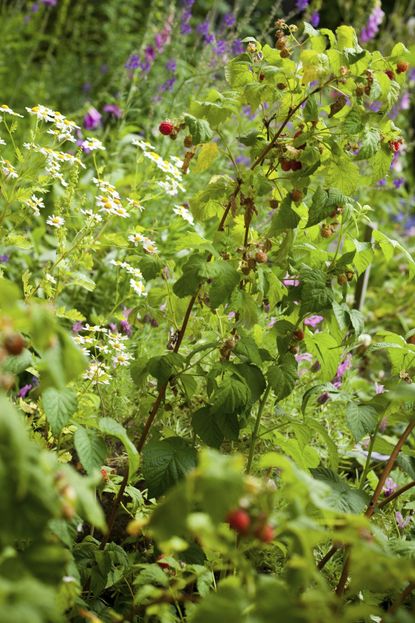Raspberry Companion Plants – What To Plant With Raspberries


Raspberries grow wild in most places in the U.S., planted here and there by birds or spreading from prolific underground runners. It’s easy to assume that plants, like raspberries, which grow so readily in nature would be easy to grow in the garden. Under this assumption, you buy some raspberry plants and stick them in the ground, but all season they struggle and produce very little fruit.
Sometimes, problems with raspberry bushes can be caused by the plants around them or what the soil once housed. Other times, problems with raspberries can easily be resolved with beneficial companion plants. Learn about raspberry plant companions in this article.
Companion Planting with Raspberries
Raspberries grow best in well-drained, slightly acidic soil that contains lots of organic material. Before planting raspberries, you may need to amend the soil to add organic material and valuable nutrients.
One way to do this is to plant and grow a cover crop for one season prior to planting raspberries in that location. Cover crops like this are grown for a season and then tilled in, adding organic material and nutrients as they decompose in the soil. Good cover crops for raspberries are:
- Buckwheat
- Legumes
- Field brome
- Japanese millet
- Spring oats
- Sudan grass
- Annual ryegrass
- Winter rye
- Clover
- Hairy vetch
- Alfalfa
- Canola
- Marigolds
Sometimes, plants that were in the area before can actually cause problems with the growth or health of raspberries. Raspberry bushes should not be planted in an area where potatoes, tomatoes, eggplant or strawberries have grown in the last five years. They also should not be planted near these growing plants because of blights and other fungal diseases, like verticillium wilt, which can spread from these plants to raspberries.
What to Plant with Raspberries
With canes that can grow 8 feet (2.5 m.) long, raspberries can be grown upright on trellises or as espaliers. Growing the canes vertically can help prevent fungal diseases and leave adequate space for beneficial companion plants. When used as companion plants for raspberry bushes, the following plants can help prevent fungal diseases, like cane spot. They can also repel certain insects, rabbits and deer:
When companion planting with raspberries, another thing to consider are plants that attract bees. The more bees that visit raspberry bushes, the more raspberries the plant will yield. Raspberry plant companions that attract pollinators, while repelling harmful pests, include:
Gardening tips, videos, info and more delivered right to your inbox!
Sign up for the Gardening Know How newsletter today and receive a free download of our DIY eBook "Bring Your Garden Indoors: 13 DIY Projects For Fall And Winter".
- Chervil and tansy (repels ants, Japanese beetles, cucumber beetles, squash bugs)
- Yarrow (repels harlequin beetles)
- Artemisia (repels insects, rabbits, and deer)
Turnips are also used as companion plants for raspberry bushes because they repel the harlequin beetle.
-
 Grow A Container Winter Wonderland: 7 Best Winter Flowers For Pots With Cool-Season Cheer
Grow A Container Winter Wonderland: 7 Best Winter Flowers For Pots With Cool-Season CheerContainers don’t need to go into hibernation in colder months – there’s still plenty of floral life to be enjoyed! We round up some of the very best winter flowers for pots
By Tonya Barnett
-
 How To Buy The Best Electric Composter: Read This Before Spending $100s On A Countertop Food Recycler
How To Buy The Best Electric Composter: Read This Before Spending $100s On A Countertop Food RecyclerElectric composters and countertop food recyclers offer a super-fast solution to tackling food waste – and can help create nutrient-rich compost. Choose the best model for your needs with our expert guide.
By Melanie Griffiths